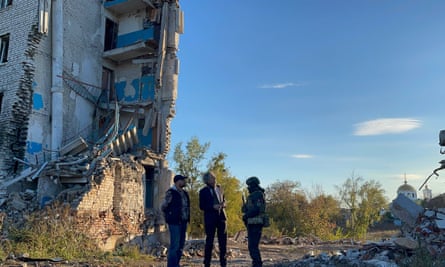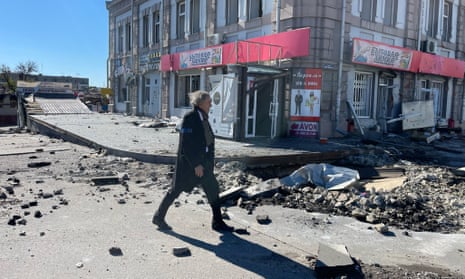In the fall of 2022, Bernard-Henri Lévy, one of France’s most famous and polarizing public intellectuals, traveled to Ukraine for a series of visits along the fault lines of the Russian invasion. He witnessed bombed-out apartment buildings in Kyiv, where he had once met with the Ukrainian president, Volodymyr Zelenskiy, and where civilians were still liable to be awakened in the night by Russian blasts. He accompanied miners deep into the earth in Pavlograd, toured the Zaporizhzhia nuclear plant, joined the Ukrainian navy on a patrol outside Odesa, met with commanders of an international legion in a nondescript room whose only decoration was, inexplicably, a Big Mouth Billy Bass.
Such is the collage of lasting images captured in Slava Ukraini (“Glory to Ukraine”), Lévy’s documentary filmed over 10 trips to the country: devastating, resilient, admirable, often infuriating, sometimes surreal, at times relaxed and even a little funny. The 95-minute documentary, Lévy’s second film on the conflict, traces the three-month arc of the Ukrainian counter-offensive through many of the occupied eastern territories, from Kyiv to Bakhmut, Lyman, Izium, Kharkiv and Donbas, culminating with the liberation of Kherson in November.
The film plays as a war diary, each chapter a different location and a different tone, though all connected by a current of fury and defiance. Lévy begins his journey in the shadows of the war – a shot of a stuffed bear left on an empty swing, a smudged church icon half-buried in rubble, plenty of destroyed Soviet buildings; a woman wearing fatigues, pushing a stroller in heels (she tells Lévy she and her toddler live underground, for safety); mounds of sand in the woods which denote mass graves. By mid-film, he’s embedded with an international legion on the frontline of the counter-offensive, facing drone attacks that nearly destroy one cameraman’s car. And yet, life goes on – in Kyiv, children play and people casually chat as sirens blare.
“The big surprise for me was that there was no fatigue,” Lévy told the Guardian in a recent interview. “Normally after six months, eight months, one year, you are fatigued. But the fatigue was in the west, not in Ukraine.” Western audiences may have grown tired of reading about Putin’s unnecessary and cruel incursion on Ukrainian territory; many might not even know the war is ongoing. Lévy made his film, he says, to argue for a sense of urgency, and to showcase “the indomitable, untamable resistance, high spirit, courage, optimism of these people in spite of the ruins, in spite of the losses, in spite of the disaster”.
Lévy, a writer, philosopher and television personality ubiquitous enough in France to be known simply as BHL, has drawn criticism for the rigor of his methods (in one of his books, he seriously cited at length a philosopher invented as a satirical character by the writer Frédéric Pagès; he later complimented the author for the persuasiveness of his creation). Some have mocked the 74-year-old, born in French Algeria to a Sephardic Jewish family, for being a dilettante – a decadent, out-of-touch pop philosopher touring war zones in such conflict-ridden places as Bosnia, Darfur, Libya and Kurdistan.
Slava Ukraini, co-directed with Marc Roussel, does not necessarily counter those charges. Lévy’s strolls around the eastern front with a bulletproof vest strapped over a designer suit, and plays vox pop with Ukrainians with various shades of frustration or terror (many willingly tell their story or show off their dire conditions, both as a statement of fact and a testament to their resilience). His French narration trends flowery and pedantic (steelworkers are the “nobility of the proletariat” who “forged” victory; trenches toured on the front are “that archaic habit of men”). It’s never clear in the film how Lévy inserted himself into the Ukrainian foreign legion.
But the images he captures, as well as the testimonies from numerous Ukrainians, are striking and raw. There’s the woman making Ukrainian borscht over a fire in her backyard, tending a wish that the war will lighten enough to see everyone for her 70th birthday. An elderly woman who demonstrates, desperately and defiantly, how she spent a freezing night in a chair in her bathroom, the walls opened to the cold by airstrikes. There are countless shots of building skeletons, as well as several corpses. We see a photo taken of Lévy with the legion; weeks later, he can point to some of them who are already gone. War zones are chaotic, but the logic of the Russian offensive on civilian targets confounds even those fighting them. “What is this insane war, where the enemy attacks a city with no collective or strategic importance?” Lévy asks in voiceover.
The Russian motivation, as he can see it, is “to really negate, deny, destroy the Ukrainian identity”, said Lévy, dating back to what he calls the “real beginning” of the war, when Russia invaded the Crimea in 2014 with little international blowback. “Putin starts from the hypothesis that Ukraine does not exist, that Ukrainian culture does not exist,” he said. “Therefore in order to make the reality match with his creed, what can he do? Kill, bomb, destroy, scorched earth. If I dare give a certain logic to this crazy war, it is in the logic of the denial of the Ukrainian identity. This barbarity matches with this logic of the denial of the very existence of Ukraine.”

As a result, Lévy views the war, in and out of the film, as a conflict for nothing less than the soul of Europe, the future of liberalism, and the sanctity of human rights. “I think that without the resistance of the Ukrainians, maybe the Baltic states would be invaded at this moment. Certainly the Chinese would have started their operation on Taiwan, and so on,” he said.
“I’m not sure the west understands, really, what is at stake,” he added. “I made those movies, and especially the last one, to try to convince. At least to remind the truth, and if possible to convince.”
The sentence he heard most from his many conversations with Ukrainians – be it soldiers, mothers, miners, children, grandmothers – was that “we not only defend our fatherland, we defend yours, because we defend Europe.”
“The Ukrainians often thank us for our help. It should be the reverse,” said Lévy. “We should thank them. This was my feeling constantly – the ones who should thank is not them but us.”
Lévy is careful not to speculate on the future of the war in the film, instead focusing on eyewitnesses. But after numerous trips, he has a “conviction that the Ukrainians will win”. It’s just a matter of how long, at what cost, and with what help from western nations. “Every week, every day, has a real cost,” he said. “And by delaying this victory, by refusing to speed, the west takes huge responsibility. The more the victory of Ukraine is delayed, the more the disaster grows.”
Slava Ukraini premiered in February in France and will open in US theaters this month. But of particular significance to Lévy was a screening this past week at the United Nations, where Russia just wrapped a shameful tenure as president of the security council. “I hope that they will see what I know,” said Lévy of the many diplomats in attendance that night. “I hope that they will figure out what they owe. And I hope that this will have an effect in some of the states that will be represented that night.”
Slava Ukraini is out in US cinemas now with a UK date to be announced
